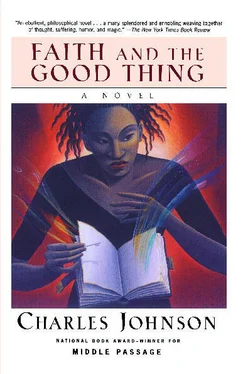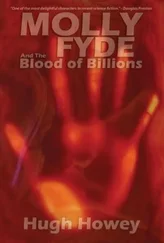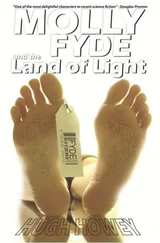Faith wanted to stand up, raise her hand, and cast a question. Instead, she waited, certain he was talking to her.
“So, because God was so remote, so inaccessible, He sent his only Son, as flesh, blood, gristle, and bone, to show us how to get closer to Him — to seize the root of this thing greater than any of us can be.” He slammed his Bible on the podium. Raised his voice. “And even that wasn’t enough! It was still too far away. Can you imagine that gulf between man and his greatest goal? Can you see how horrible it is to be separated by all the universe from the thing we need most? Only one step remained: to look inside ourselves — to put it so close we don’t have to search all over the world no more!” The minister tapped his chest, then smacked it hard. “It’s in here! That’s the only place it is, or could ever be — in your hearts!”
In here. Faith laid her right hand along her left breast. She held her breath and closed her eyes, searching for this truth but finding only a memory there. A bad one, at that. She remembered the spring evening eight years after her father’s death when Reverend Brown came visiting. No — he came to confess. She’d always wondered to whom troubled men of the cloth carried their cares when the Lord did not or could not answer their call. Brown took his to Lavidia. Why he did she could only conjecture: because Lavidia had known and transcended grief, because she realized in her flesh, in her blood, at the floor of a hot tent that summer night long ago, all Brown could know only in theory. And theory alone. He came. They saw his car roaring up the road before a cloud of crimson dust.
Brown parked it in the brown shade of an oak in the front yard, and slowly removed his bent straw hat. Said, “Evenin’, Sister Cross.” His voice cracked. Faith knew something was wrong; she could feel it in her throat. Especially when Brown looked irritably at her, winced, then turned to Lavidia. “Can I talk with you alone?”
Without waiting for her mother’s response, Faith fled into the farmhouse, creeping barefoot across the quiet front room to the window where, behind a drawn curtain, she heard Reverend Brown’s agonized voice.
“What’s troublin’ you, reverend?”—Lavidia.
Faith, her hand on the dry curtain, expected them to conceive yet another plan for her wayward soul’s salvation — some nocturnal trip to the river of another county where she would be baptized, or another riotous prayer meeting in a close tent on a sweltering summer eve.
“Jennie Scott just died,” Brown said.
“Lord have mercy,” Lavidia cried. Faith heard the scraping of her mother’s nails on her brow. “Reverend, she wasn’t but sixteen! It was that sickness she had, wasn’t it? Loo, looo—”
“Leukemia,” Brown sighed.
Through a crack in the curtain Faith could see Brown leaning as lifeless as a scarecrow against the porch railing.
“I prayed night and day for that gal,” he said. “Damn if I didn’t almost go down to the bogs to call on that crazy woman for her!” With his thumb and forefinger he squeezed his nose, so hard Faith felt the bridge of her own nose ache. “I told her parents — when there didn’t seem to be no hope — that sufferin’ was a teacher, that there was some lesson in it that we just couldn’t see. but what ? Livvie, that child never hurt no body!”
“I know, I know,” Lavidia moaned. “There ain’t no answer, I guess. It sure wasn’t your fault, reverend.”
“Wasn’t it?” Brown cried. His fingers tightened on the railing; his knuckles were white. Brown turned his back to Lavidia and hung his head out toward the yard. “It must have been me!” Then he turned around, openmouthed. Sweating. “Have you ever doubted the purity of your faith, Livvie — I mean, that’s a good reason for the Lord never answerin’ when you call, don’t you think?”
“No.” Lavidia’s voice trembled. “I don’t never doubt it—”
You could hear the floor of the porch cry under Brown’s heels. Faith imagined him breathing with irregularity, like an overworked horse, the sweat steaming at the curly roots of his sparse gray hair. “Haven’t you ever. doubted that what you were doing was right?”
“I do what the Lord wants,” Lavidia said.
The porch buckled again; the floorboards creaked as Brown moved closer to Lavidia’s rocker. “Some people — like you, ’way back when you got the spirit and heard Him talkin’ to you: you knew then, didn’t you? I mean, He touched you, rolled you around that tent floor with His big black toe. I saw it happen to you, Livvie! And you knew clearer than I’ll ever know what He wants.” The reverend’s voice went sharp, splintering like dry kindling split by an ax. “It never come to me that way. It don’t happen like that to most people. I’ve got faith and religion, but not like I seen it come to some people like you. It didn’t happen to me like that. I. decided to follow the Cross, ’cause what it stood for seemed to be everything I wanted to be like.” Brown looked away from her, as though he’d said too much. “I pray for understanding, Livvie. I look for some kind of sign. ”
Lavidia’s breathing was as loud as that of a cow.
“Nothin’ comes,” Brown groaned. “How do you really know what you’re doin’ and believin’ is right? Don’t mistake me now! I don’t doubt for a minute that He’s out there, but, from day to day, how do you really know?”
Faith suffered a long, long silence as Lavidia waited, puffing her best briar pipe. “You feel it, I guess,” she said. “You ought to know ’bout that better’n me—”
“Feelin’s ain’t certain !” Brown slammed something, perhaps his fist, against the wooden railing. It shook the house. “I feel Jennie oughta be alive!”
It seemed suddenly to Faith that the porch was empty. She heard the mindless prattle of chickens in the barnyard, the wind crackling, like the rustling of crumbling cellophane, in the trees. She peered from behind the curtain and saw Reverend Brown resting silently on his knees beside Lavidia, searching her face for a sign.
“Feelings belong to the flesh,” he said. “I can feel the wind comin’ up, I can feel it gettin’ cooler, ’cause the sun’s goin’ down.” He pointed a finger at his temple. “But my mind ain’t at ease with that. It wants to be absolutely sure!” Brown pressed the heels of his hands against his wet forehead. “Sometimes I ain’t even certain if Father Divine or Prophet Cherry knew what was right all the time!” He touched Lavidia’s bony wrist. “When it happened to you — what was it like, Livvie?”
For reasons she could not describe, Faith felt a wave of uneasiness. It was like he’d asked for a description of the way Lavidia and Todd made love.
“It was kinda soft, like the way you’re touchin’ me now,” Lavidia said. “But it wasn’t like the touch of no livin’ man. It was like He put His hand across my breasts, and they exploded, and shot out into the tent, and carried somethin’ inside me through the air, clear up to some dizzy spot above the world. I was kinda dead, but alive, too, because I couldn’t stop shakin’ on the ground. I saw myself shakin’—it was like I was lookin’ at myself from far, far away, right beside Him, or maybe all alone in some dark place like a cave. And I was watchin’ what was left of me the way you look at the wigglin’ of a chicken with its head wrung off. It didn’t matter none. That thing on the ground wasn’t me. I knew that, reverend. It was like a box I’d been kept in all these years—”
Reverend Brown nodded. Water fell from his eyes. “And you knew the soul was immortal; you knew it brought you ’cross that wide sea between man and God. That was the sign he gave you. ”
Читать дальше












